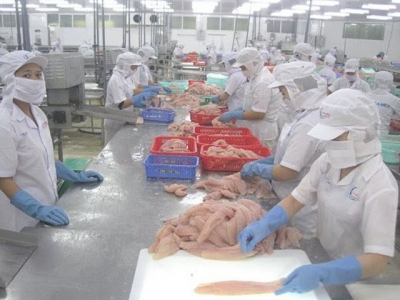U.S. postpones assessment of Vietnams tra fish safety

CAN THO – The Food Safety and Inspection Service (FSIS), under the U.S. Department of Agriculture, has delayed its visit to Vietnam to assess Vietnam’s food safety control system for Siluriformes fish order, mainly tra fish, for the second time, from March 2 to 13.
Workers process tra fish for export at a local firm. The Food Safety and Inspection Service, under the U.S. Department of Agriculture, has delayed its reevaluation of Vietnamese tra fish’s food safety control system - PHOTO: TRUNG CHANH
Nguyen Hoai Nam, deputy secretary of the Vietnam Association of Seafood Exporters and Producers, today, March 3, confirmed the information with the Saigon Times.
Nam said the delay may be due to the spread of the coronavirus.
Dr Michelle Catlin, an international coordination executive for the U.S. Department of Agriculture, has also written to Nguyen Nhu Tiep, head of the National Agro-Forestry-Fisheries Quality Assurance Department (Nafiqad), under the Ministry of Agriculture and Rural Development, notifying him of the delay.
Catlin stated that the U.S. Department of Agriculture will arrange another visit to Vietnam soon but no further details on the timeline were provided.
Earlier, Nafiqad Deputy Director Ngo Hong Phong noted that the department on January 20 had received FSIS’ announcement to send a working team to Vietnam to evaluate Vietnam's food safety control system for tra fish, which will be exported to the United States, for the second time, from March 2 to 13.
The first evaluation of the country’s food safety control system for Siluriformes fish was conducted in May 2018.
Accordingly, the working team launched on-site inspections of the food safety control systems of two central surveillance agencies, a testing room run by Nafiqad, eight tra fish processing factories and two tra fish farming facilities.
FSIS hailed Vietnam’s efforts toward food safety control, especially its regulations and the enforcement of these regulations, but pointed out its shortcomings.
Specifically, the results of the operational sanitation monitoring systems at all audited establishments were not fully documented and Nafiqad inspectors did not identify the failure to document these results. In addition, at two establishments, product washing machinery was constructed with piping that could not be disassembled for a full inspection to verify sanitation.
Further, some equipment was in a deteriorating condition.
Nafiqad later provided evidence demonstrating that these local establishments had addressed such shortcomings.
On November 12 last year, FSIS recognized the compatibility of Vietnamese tra fish’s food safety control system with its own standards but stated that it would conduct a reevaluation of the system to maintain Vietnam’s food safety control system for tra fish being exported stateside.
Có thể bạn quan tâm
 Tuna exports to EK not affected by Brexit
Tuna exports to EK not affected by Brexit The UK has officially left the European Union (Brexit), and has entered a “transition period” until the end of December 2020, so exports to the UK
 Study questions cleaner fish efficiency - Part 1
Study questions cleaner fish efficiency - Part 1 Claims that using cleaner fish to remove parasitic sea lice from farmed salmon can be economically or ethically justified are not backed up by “robust evidence”
 Study questions cleaner fish efficiency - Part 2
Study questions cleaner fish efficiency - Part 2 The outcomes of this research will enable the industry to use cleaner fish judiciously and strengthen focus on creating cage conditions that optimise cleaner